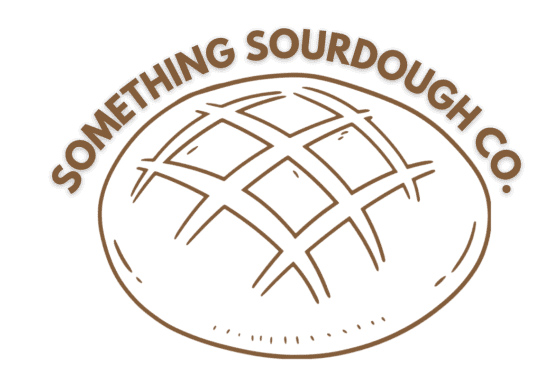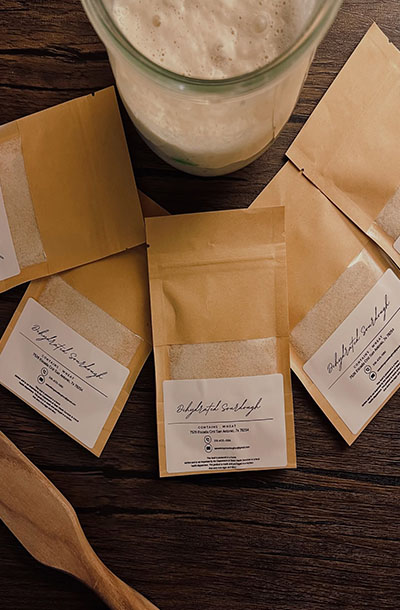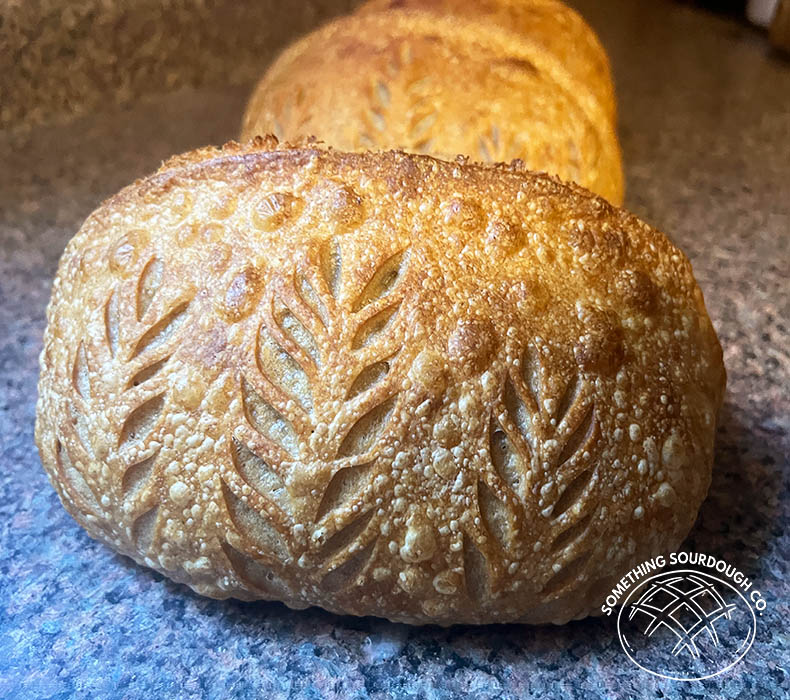Blog by: Heather Martin – Something Sourdough CoHealing from the Inside Out There was a time when I barely recognized myself. At over 230 pounds, struggling with my health, and recently diagnosed with Non-Alcoholic Fatty Liver Disease (NAFLD), I felt trapped in a...

Healing From the Inside Out: My Journey with Sourdough
Blog by: Heather Martin – Something Sourdough Co
Healing from the Inside Out
There was a time when I barely recognized myself. At over 230 pounds, struggling with my health, and recently diagnosed with Non-Alcoholic Fatty Liver Disease (NAFLD), I felt trapped in a cycle of poor eating habits, exhaustion, and frustration. As a mother of two at the time, I knew I had to make a change—not just for myself, but for my family. That day, I made a promise: I would take control of my health, heal my body from the inside out, and break free from the processed foods that had ruled my diet for so long.
Little did I know, the answer would come in the form of something ancient, simple, and powerful—sourdough!
My Journey with Sourdough
The Wake Up Call
My NAFLD diagnosis wasn’t just a wake-up call—it was a full-blown alarm. I had spent years eating ultra-processed foods, relying on quick meals, and neglecting what my body truly needed. I felt sluggish, bloated, and uncomfortable in my own skin. But beyond the physical toll, I was scared. I knew that if I didn’t make drastic changes, my health would continue to decline, and that wasn’t an option.
I began researching gut health, whole foods, and natural ways to support my body’s healing process. One thing kept coming up—fermentation. The more I learned about the benefits of long-fermented sourdough, the more I became fascinated. Unlike commercial bread, which is packed with preservatives and processed ingredients, sourdough undergoes a natural fermentation process that breaks down gluten, reduces phytic acid, and makes nutrients more bioavailable. It wasn’t just bread—it was a living, healing food.
My First Loaf

Determined to make changes, I decided to try making my own sourdough. I remember the moment I mixed flour and water together for my first starter, watching it bubble and come to life over the next few days. It felt like a small but powerful step toward something bigger.
That first loaf wasn’t perfect. In fact, it was far from it. But the process of making it—the patience, the connection to real food, the act of creating something with my own hands—was transformative. With every bake, I felt more empowered. Sourdough became more than just a staple in our home; it became a symbol of the change I was making in my life.
Losing 100 Pounds in 10 Months
As I cut out processed foods and focused on nourishing my body with real, whole ingredients, I started to see changes. The bloating disappeared, my energy levels skyrocketed, and the weight started coming off—fast. I wasn’t starving myself or following some fad diet. I was simply fueling my body the way it was meant to be fueled.
I lost 100 pounds in 10 months, but more importantly, I regained my health. My NAFLD improved, my mindset shifted, and I felt stronger than I had in years. It was never about being a certain size—it was about feeling alive again.
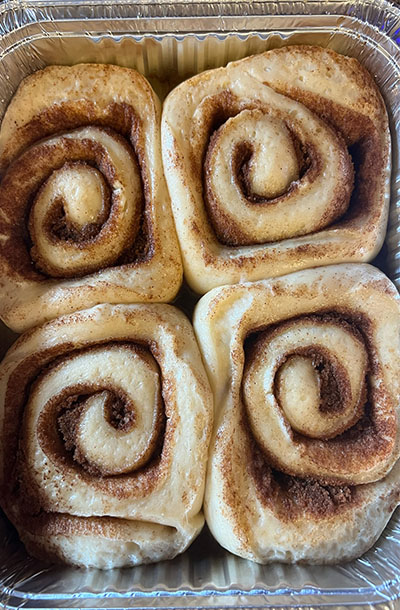
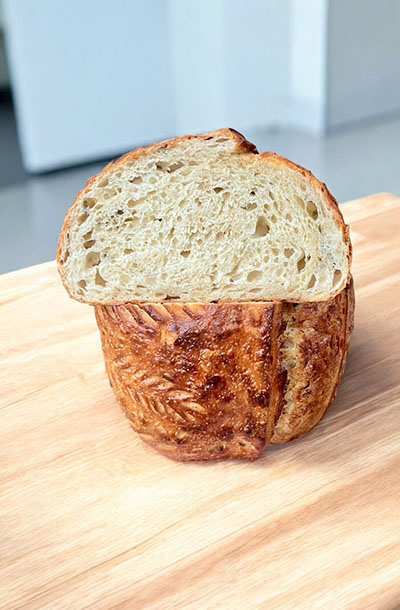
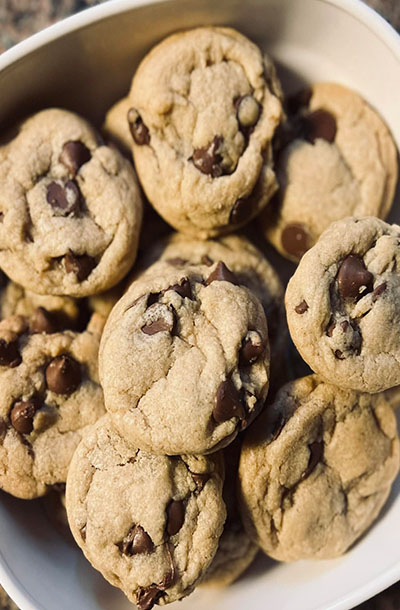
From Porch Pickups to Farmers Markets
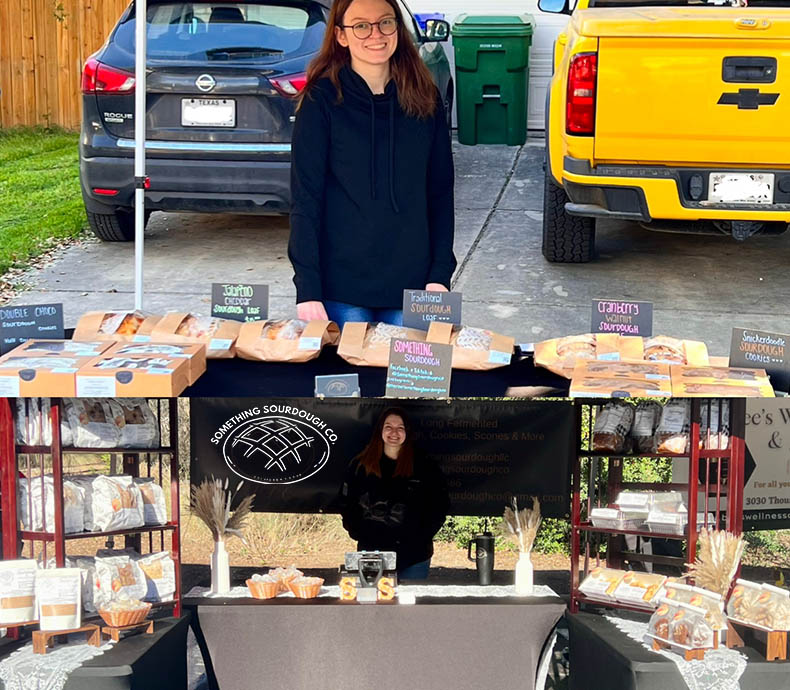
As I shared my sourdough journey with friends and family, people started asking if they could buy a loaf. What started as a personal health transformation quickly turned into something more. I began baking extra and offering porch pickups, thinking it would just be a small side hobby.
But demand kept growing. More and more people wanted long-fermented sourdough, not just for its incredible flavor but for the health benefits that came with it. Before I knew it, I was baking full-time, and Something Sourdough Co. was born.
Now, we’re selling at two farmers markets every weekend, offering not just bread but cookies, cinnamon rolls, pizza dough, and more—all naturally fermented with wild yeast. Every bake is a labor of love, a reflection of the journey that brought me here, and a way to share the healing power of sourdough with our community.
Eat for Your Future Self, Not Your Current Self
If there’s one thing I’ve learned through all of this, it’s that the choices we make today shape our future. Every meal, every ingredient, every bite—it all adds up.
I chose to eat for my future self, and it changed everything. Now, I get to help others do the same.
If you’ve ever felt stuck in a cycle of unhealthy eating, know this: it’s never too late to change. You don’t have to overhaul everything overnight. Just start with one step.
Maybe that step is choosing whole foods over processed ones. Maybe it’s learning to cook from scratch. Or maybe, just maybe, it’s baking your first loaf of sourdough.
Wherever you are on your journey, I hope you know that healing is possible. Your future self is waiting.
And if you ever need a good loaf of sourdough to get you started, well, I know just the place.
The Difference Between Real Sourdough vs Store-Bought “Sourdough”
Not all sourdough bread is created equal. Many store-bought loaves labeled as “sourdough” are not truly fermented but instead use commercial yeast with added sour flavoring. To reap the digestive benefits of real sourdough, it’s important to look for bread that is:
- Made with a natural starter (wild yeast and bacteria)
- Fermented for at least 12-24 hours at minimum
- Free from commercial yeast, preservatives, and additives
If you’re unsure whether a store-bought sourdough is the real deal, check the ingredient list. A proper sourdough should only contain flour, water, salt, and starter no added yeast or unnecessary ingredients.
Sourdough isn’t just delicious it’s also one of the most digestible forms of bread available. Thanks to its natural fermentation process, it:
- Breaks down gluten for easier digestion
- Reduces phytic acid to enhance nutrient absorption
- Supports gut health with prebiotic properties
- Stabilizes blood sugar levels for sustained energy
- Minimizes bloating and digestive discomfort
For those looking to improve digestion without giving up bread, real sourdough is a fantastic choice. Whether you buy from a trusted artisan baker or make it yourself, choosing long-fermented sourdough over conventional bread can have lasting benefits for your gut and overall health.
If you’re ready to experience the benefits of real sourdough, why not try a fresh loaf from Something Sourdough Co…
We bake with love, tradition, and a commitment to gut-friendly goodness.
What’s Your Sourdough Story?
Have you noticed a difference in digestion since switching to sourdough? Let us know in the comments below!
Learn More…
Healing From the Inside Out: My Journey with Sourdough
Why Sourdough is Better for Digestion
TheScience Behind Sourdough bread has been enjoyed for thousands of years, long before commercial yeast became widely available. Beyond its deep flavor and rustic charm, sourdough has gained attention for its unique health benefits especially when it comes to...


Hours:
Saturday: 10am - 2pm
Sunday: 10am - 2pm
Locations:
Saturday: Just Pots Market
Redland Rd at 1604
Sunday: Shavano Market
NW Military Rd at DeZavala
